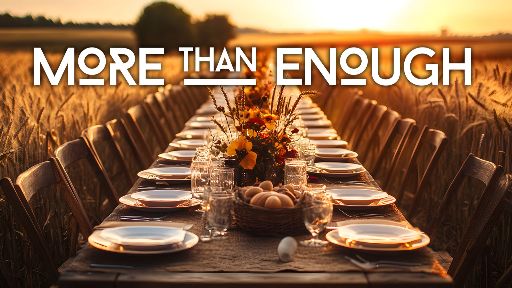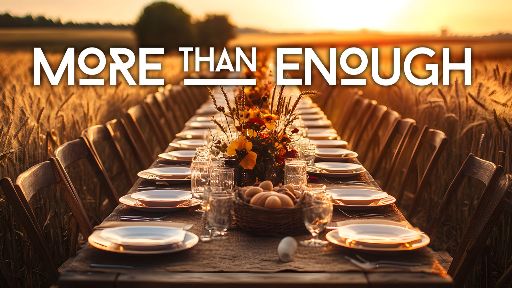-
Five Plus Two Does Not Equal Seven, Revised 2014
Contributed by Craig Condon on Nov 28, 2017 (message contributor)
Summary: But following Jesus is a radical lifestyle, and Jesus asks us if we are willing to do the same. Are we willing to give up some of what we have, that others might not go hungry? Are we willing to give out of what God has given to us?
Have you ever heard of the saying, “Every dark cloud has a silver lining”? If so, then the story of the loaves and fishes is a good example. Let me explain.
This story happens just after the death of John the Baptist. When Jesus heard that his cousin was beheaded, he did what most of us do when a friend or relative dies-he went off to a quiet place to think, pray and grieve. Unfortunately, to paraphrase the words of that great Scottish poet Robbie Burns, Jesus’ best laid plans were led astray by God.
People had heard of Jesus and his teaching and healing, and they wanted what he had to offer. They searched for him and found him just when he wanted to be alone. Was he angry with them? No. On the contrary, he had compassion for them and taught them and healed the sick. Christ’s compassion made him unable to ignore the needs of the people.
By night time, the people were still there, and they did not have anything to eat all day. The disciples wanted Jesus to send them away so they could get food in the nearby villages, but Jesus had other ideas, and just like the crowd interrupted Jesus’ plans, Jesus in turn interrupted the disciples’ plans. He told them to feed the crowd.
Now, the disciples had a problem. Where were they going to get enough food? All they had was five loaves of bread and two fish, and that certainly would not be enough to feed everyone-or so they thought. God often asks his people to do the impossible, but he makes the impossible possible. He gives us the strength and resources to complete tasks that we can’t complete on our own.
Jesus was in control of the situation. He gave instructions about how the situation was to be resolved. Jesus took the food, blessed it and had the disciples distribute it to the people. Low and behold, there was MORE than enough food-in fact; there were 12 baskets of leftovers!
The miracle of the loaves and fish is that it shows that in God’s kingdom there is enough of everything for everyone. Jesus’ ability to create so much out of so little shows his mastery over the natural realm. The miracle shows us God’s character, the nature of the coming Kingdom, and the nature of the Kingdom in our hearts when it has transformed us. Our heavenly Father, as the head of the household, establishes the household, sustains and liberates us and guides us to spiritual fulfillment. The foundation of God’s household is the duty he imposes on us to care for each other.
Jesus always seems to be asking more of us than we have to give-as spouses and parents and students and workers and on and on. He calls on us to love, even when love is difficult; to forgive, even when we have been wronged; to stand fast and firm on our principles, even when it mean standing alone. And those things are not easy to do. After all, we are not Jesus, and our powers are not unlimited, as his were.
God’s abundance is right here, right now, wherever right here and whenever right now may be. We think we don’t have enough not because our supplies are too small, but because our “we” is too small. The “we” includes God and the gifts of all those among whom we are sent as Christ’s body. Indeed, far more of the gifts are “out there” than “in here”. That’s how it is that ministry in God’s kingdom grows by becoming viral and multiplying. God meets our needs daily. He will give us what we need when it is needed. Matthew 6:32-33 reads, “Your heavenly Father already knows your needs. Seek the Kingdom of God above all else, and live righteously, and he will give you everything you need.”
Jesus bore witness to our spiritual duty to care for each other. There is enough for everyone when we live in right relation and harmony, but in reality there are millions of people who live in poverty and are starving. What can we do? Well, we can do what Jesus did. Jesus took the small amount of food that was offered and used it to do his work by using it as an example for the disciples and for us. When we give to God, no matter how much or how little, it is returned to us tenfold. We provide the best we can to do God’s work, and God rolls up his sleeves and gets to work with us. We have to work with God and with other people. When we work together and use what we have to do God’s work, God will multiply what we offer, because he is driven by our needs and not by our wants.

 Sermon Central
Sermon Central



